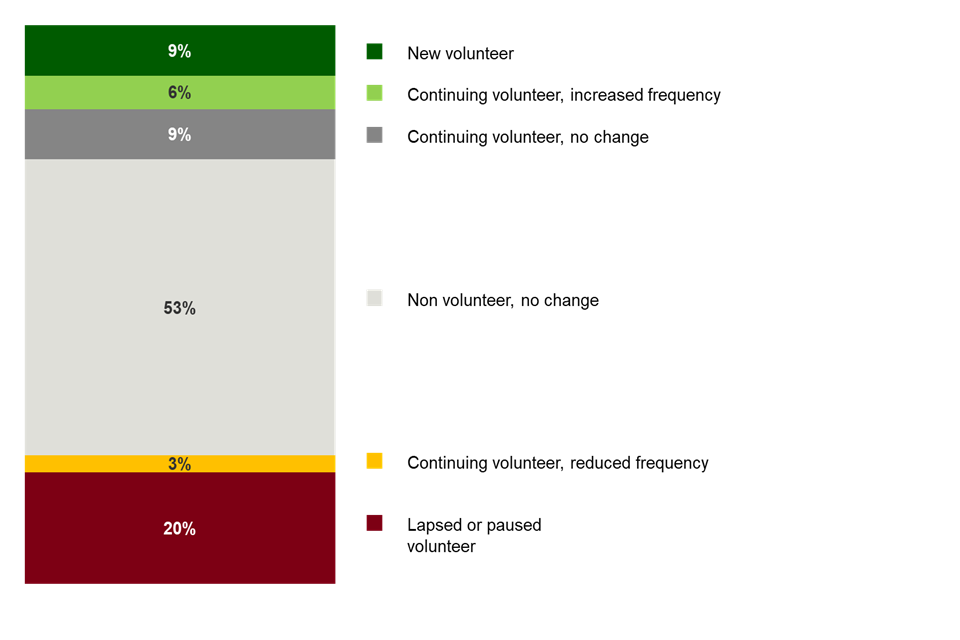A look at volunteering during the response to COVID-19
Published 11 January 2021
Applies to England
1. Introduction
It’s been a remarkable year for volunteers and the voluntary sector, as for many of us. Volunteers have turned out in their droves to do whatever they can to help out and it’s so important to recognise and celebrate people’s contributions. Some volunteers deservedly have their name in festive lights over London’s Oxford Street, such as Anis Ali, who has completed over 700 tasks as an NHS Volunteer Responder.
DCMS commissioned Kantar to do the Community Life COVID-19 Re-contact Survey to better understand the role played by volunteers during the pandemic, among other things. The survey, which was carried out from 7-26 July, is based on our long-running Community Life Survey, enabling us to compare change between the time before and during COVID-19. Responses were sorted for demographics to ensure that this is a nationally representative sample for England.
2. Formal volunteering
Volunteers have given unpaid help to a range of organisations or clubs, including to over 3000 Mutual Aid Groups. Across England, around 21% of people formally volunteered at the beginning of the pandemic.
The table below shows that there’s been a noteworthy change in who did and didn’t volunteer. 9% of respondents were new volunteers and about 6% were volunteers previously, but increased how much they did. A further 9% continued at the same rate, while 53% didn’t volunteer at all. People who identified as Ethnic minorities (excluding White minorities) were more likely to start volunteering for the first time between March and July this year, compared with those from a White background (12% vs. 8%). About 20% of people lapsed or paused their volunteering and 3% reduced how much they volunteered.

Table showing the rates of formal volunteering between March and July 2020.
3. Informal volunteering
COVID-19 has seen innumerable acts of kindness, giving unpaid help to people who are not relatives - referred to here as informal volunteering.
47% of people informally volunteered during the pandemic and 52% of those were helping people affected by COVID-19. These informal volunteers were more likely to carry out certain tasks than in the pre-pandemic period:
- keeping in touch with someone who has difficulty getting out and about (58% of regular informal volunteers from March to July, compared to 43% before)
- shopping, collecting items, medicine etc. (49% compared to 23% before).
These volunteers were less likely to carry out tasks like helping by transporting or escorting someone (23% pre-pandemic vs. 8% from March to July).
Two points from the survey stand out. The first is the extent to which we can see people helping people during this pandemic - volunteers have played a vital role in the response to this crisis. And they continue to do so.
The second is that COVID-19 has affected who volunteers and when. Among the 20% who lapsed or paused their volunteering, there were notable changes in who volunteered:
- 22% of female respondents volunteered less, compared with 18% of male respondents;
- 28% of those aged 16-24 volunteered less;
- 26% of respondents with a limiting long-term illness or disability volunteered less.
Work commitments, doing other things in their spare time, and childcare commitments were the top three barriers to getting involved both before and during the pandemic. A new barrier emerged too: 26% of respondents who had not volunteered said that COVID-19 was an issue. The pandemic has brought familiar and new challenges in encouraging and enabling people to volunteer.
In the Office for Civil Society, we’re taking a more data-driven approach, such as with the Re-contact Survey, to build our evidence base and inform the design and delivery of new policies aimed at supporting volunteering. Those policies include inspiring and enabling more people to volunteer by making volunteering as inclusive, accessible and rewarding as possible.
Contact us at covid-volunteering@dcms.gov.uk if you would like to talk about volunteering data and insights.
